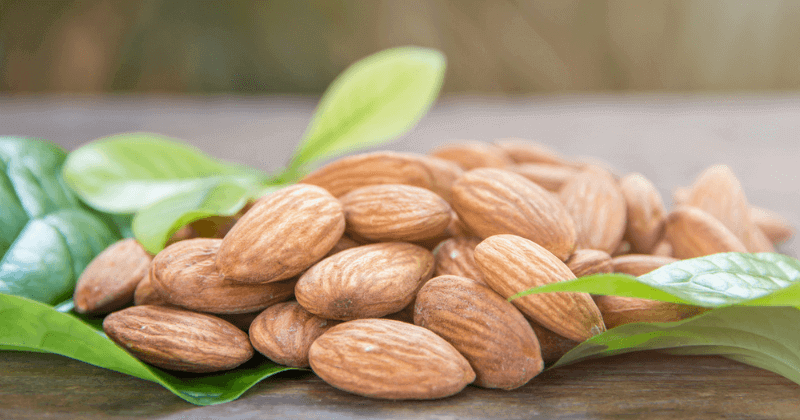How Much Protein In 4 Almonds?
Almonds are one of the most popular nuts in India, known for their rich taste and impressive health benefits.
Whether you snack on them raw, add them to your smoothies, or use them in desserts, almonds are a powerhouse of nutrients.
But have you ever wondered, "How much protein is in 4 almonds?"
In this detailed guide, we’ll explore the protein content in almonds, their nutritional profile, health benefits, and how they compare to other protein sources.
Whether you're a fitness enthusiast, a health-conscious individual, or just curious, this post will give you all the answers!
How Much Protein In 4 Almonds?
On average, 4 almonds contain ~1.2-1.5g protein. They’re also rich in healthy fats, fiber & Vitamin E. A nutritious snack for energy & health.
While this may seem small, almonds are more than just a protein source they’re packed with healthy fats, fiber, vitamins, and minerals.
Here’s a quick comparison:
| Number of Almonds | Protein Content (approx.) |
|---|---|
| 4 almonds | 1.2 - 1.5g |
| 10 almonds | 3 - 3.5g |
| 1 ounce (23 almonds) | 6g |
While 4 almonds alone won’t meet your daily protein needs, they make a great addition to a balanced diet.
Nutritional Breakdown of Almonds
Almonds are a nutritional powerhouse. Besides protein, they provide:
-
Healthy Fats: Mostly monounsaturated fats (good for heart health).
-
Fiber: Aids digestion and keeps you full longer.
-
Vitamin E: A powerful antioxidant for skin and immunity.
-
Magnesium: Supports muscle function and bone health.
-
Calcium & Phosphorus: Essential for strong bones.
Here’s the nutritional value of 4 almonds (approx. 6g):
| Nutrient | Amount |
|---|---|
| Calories | 35 kcal |
| Protein | 1.3g |
| Fat | 3g |
| Fiber | 0.7g |
| Carbs | 1.2g |
| Vitamin E | 0.7mg |
Almonds are low in carbs and high in healthy fats, making them great for keto and low-carb diets.
Health Benefits of Almonds
🌟 Supports Muscle Growth & Repair
Since almonds contain protein, they help in muscle recovery after workouts. While not as protein-dense as eggs or chicken, they’re a great plant-based protein option.
🌟 Boosts Heart Health
The monounsaturated fats in almonds help reduce bad cholesterol (LDL) and improve heart health. Studies show that eating almonds daily can lower the risk of heart disease.
🌟 Aids Weight Management
Despite being calorie-dense, almonds promote satiety due to their protein and fiber content. This helps control cravings and prevents overeating.
🌟 Improves Brain Function
Almonds are often called "brain food" because they contain riboflavin and L-carnitine, which enhance cognitive function. Many Indian parents give soaked almonds to kids for better memory.
🌟 Good for Skin & Hair
Thanks to Vitamin E and antioxidants, almonds help maintain glowing skin and reduce hair fall. Almond oil is a popular remedy for dry skin and dandruff.
Almonds vs. Other Protein Sources
How do almonds compare to other common protein sources in India?
| Protein Source | Protein per 10g (approx.) |
|---|---|
| Almonds (10g) | 2.5g |
| Peanuts (10g) | 2.6g |
| Eggs (1 large) | 6g |
| Paneer (10g) | 2.5g |
| Chicken (10g) | 3g |
While almonds aren’t the highest in protein, they provide a mix of healthy fats, fiber, and micronutrients that many other sources lack.
Best Ways to Include Almonds in Your Diet
Want to make the most of almonds? Here are some delicious and healthy ways to eat them:
✔ Soaked Almonds
Soaking almonds overnight improves digestion and nutrient absorption. Eat 4-5 soaked almonds in the morning for a healthy start.
✔ Almond Butter
Spread almond butter on whole-grain toast or add it to smoothies for a protein and energy boost.
✔ Almond Milk
A great dairy-free alternative for lactose-intolerant people. Use it in tea, coffee, or cereals.
✔ In Indian Sweets & Desserts
From badam halwa to almond barfi, Indian desserts make almonds deliciously irresistible (in moderation!).
✔ As a Snack
Carry a handful of almonds (around 10-12) for a quick, healthy snack at work or while traveling.
Common Myths About Almonds Debunked
Myth 1: Almonds Cause Weight Gain
Fact: While almonds are calorie-dense, studies show they help in weight management by keeping you full and reducing cravings.
Myth 2: Soaking Almonds Removes Nutrients
Fact: Soaking enhances nutrient absorption by reducing phytic acid, which inhibits digestion.
Myth 3: Almonds Are Only for Winter
Fact: Almonds are great year-round! They provide energy in summer and warmth in winter.
Myth 4: Raw vs. Roasted – Big Difference?
Fact: Raw almonds retain more nutrients, but lightly roasted almonds (without excess oil/salt) are still healthy.
Final Thoughts
So, how much protein is in 4 almonds? About 1.2-1.5g not a lot, but every bit counts in a balanced diet. Almonds offer much more than just protein; they’re a superfood packed with healthy fats, vitamins, and minerals.
Whether you eat them soaked, as butter, or in desserts, almonds are a versatile and nutritious addition to any Indian diet. So go ahead, grab a handful, and enjoy the benefits!
How do you like your almonds? Raw, roasted, or in sweets? Let us know in the comments!
